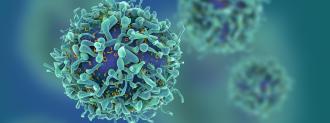Experts estimate that if 40% to 70% of the population is immune to the novel coronavirus, SARS-CoV-2, it will no longer be able to spread.
The path to that tipping point, known as “herd immunity,” will likely involve both the widespread distribution of a coronavirus vaccine (once one is ready) and natural immunity among coronavirus survivors.
But recent studies suggest that the antibodies produced by a COVID-19 infection can disappear after just a few months, meaning that immunity from antibodies might be short-lived.
Fortunately, the immune system has another set of defenses, called T cells, and new research suggests that they might provide longer-lasting protection against the coronavirus — and maybe even protect people who have never contracted it.
The Promise of T Cells
This good news about T cells comes at about the same time as some bad news about antibodies.
A study out of Spain recently found that 14% of coronavirus survivors who initially tested positive for antibodies tested negative approximately two months later.
This suggests that any protection the antibody proteins can provide might not be permanent, and studies out of China and the U.K appear to support this. This challenges efforts to make a vaccine that relies on antibody immunity.
But as one door starts to close, another opens, and it’s now looking like helper T cells — which remember past infections and spark the production of killer T cells, interferon, and new antibodies — might be able to step up to help us reach herd immunity anyway.
On July 15, researchers from Singapore and Duke University published a T cell study in the journal Nature, which found SARS-CoV-2-specific T cells in the blood of all 36 coronavirus survivors they tested.
Those cells reacted to a main protein of the novel coronavirus in lab tests, suggesting that they’d provide at least some level of protection against the virus.
The researchers have already begun follow-up tests with the study participants to determine whether these T cells are permanent (or at least longer-lasting than antibodies), but another fact suggests they might be.
In blood tests of 23 people who contracted the original SARS — another coronavirus — during the 2003 outbreak, the researchers found SARS-specific T cells in all of them, nearly two decades later, even though antibodies to the virus had disappeared within a few years.
The fact that those SARS-specific T cells have lasted a full 17 years suggests that the T cells of COVID-19 survivors might be long lasting, too.
Exposure to the coronaviruses that cause the common cold may help protect against COVID-19.
Those findings might not even be the most exciting part of the study, though.
The researchers found that the SARS-specific T cells were also reactive to SARS-CoV-2 — meaning people who recovered from that coronavirus might be protected against this one.
And when they analyzed the blood of 37 people who’d never been diagnosed with SARS or COVID-19, they found T cells reactive to SARS-CoV-2 in half of them.
“This could be due to cross-reactive immunity obtained from exposure to other coronaviruses, such as those causing the common cold, or presently unknown animal coronaviruses,” Duke researcher Antonio Bertoletti said in a press release.
Closer to Herd Immunity
A handful of other recent studies also have found T cells that react to the novel coronavirus in as many as a third to a half of people who have never had COVID-19 or SARS, but a number of important questions remain.
What level of immunity do the T cells provide against COVID-19? Would they prevent infection outright or just make it less severe? And how many people already have T cells that could combat SARS-CoV-2?
We may be closer to getting the pandemic under control than we think.
There is some reason to doubt whether the T cells created by the common cold actually provide outright immunity to COVID-19. Places with unconstrained outbreaks, such as prisons, have seen infection rates over 80%, which suggests that few people (if any) are actually immune.
But if people with T cells already have some level of protection, either making the disease less severe or making it harder to spread, we may be closer to getting the pandemic under control than we think.
In a final bit of good news, data from the Oxford coronavirus vaccine shows that the shot did produce T cells, as well as antibodies, hopefully providing a “double defense” against COVID-19.
We’d love to hear from you! If you have a comment about this article or if you have a tip for a future Freethink story, please email us at [email protected].





